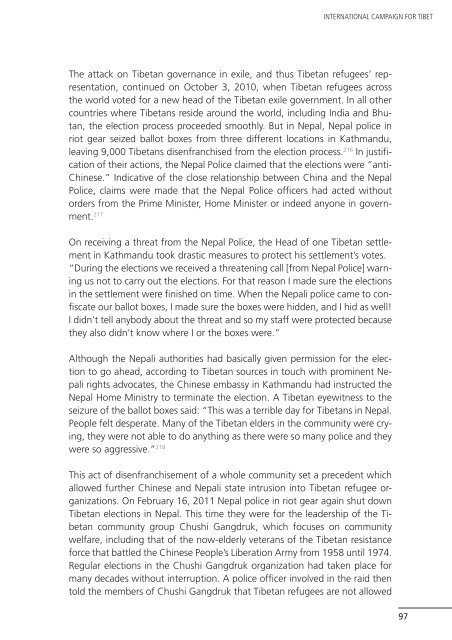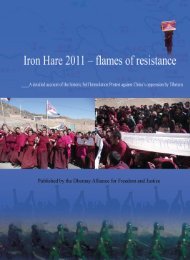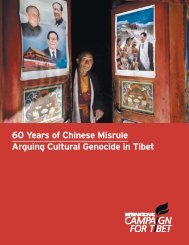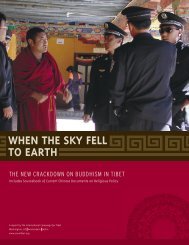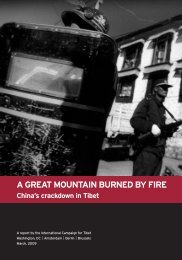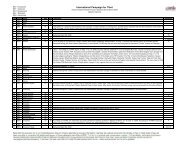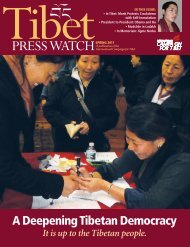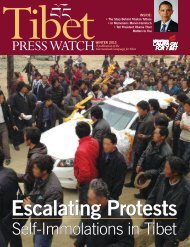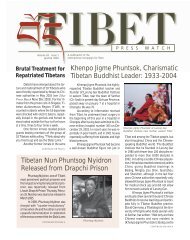DANGEROUS CROSSING: - International Campaign for Tibet
DANGEROUS CROSSING: - International Campaign for Tibet
DANGEROUS CROSSING: - International Campaign for Tibet
Create successful ePaper yourself
Turn your PDF publications into a flip-book with our unique Google optimized e-Paper software.
INTERNATIONAL CAMPAIGN FOR TIBET<br />
The attack on <strong>Tibet</strong>an governance in exile, and thus <strong>Tibet</strong>an refugees’ representation,<br />
continued on October 3, 2010, when <strong>Tibet</strong>an refugees across<br />
the world voted <strong>for</strong> a new head of the <strong>Tibet</strong>an exile government. In all other<br />
countries where <strong>Tibet</strong>ans reside around the world, including India and Bhutan,<br />
the election process proceeded smoothly. But in Nepal, Nepal police in<br />
riot gear seized ballot boxes from three different locations in Kathmandu,<br />
leaving 9,000 <strong>Tibet</strong>ans disenfranchised from the election process. 216 In justification<br />
of their actions, the Nepal Police claimed that the elections were “anti-<br />
Chinese.” Indicative of the close relationship between China and the Nepal<br />
Police, claims were made that the Nepal Police officers had acted without<br />
orders from the Prime Minister, Home Minister or indeed anyone in government.<br />
217<br />
On receiving a threat from the Nepal Police, the Head of one <strong>Tibet</strong>an settlement<br />
in Kathmandu took drastic measures to protect his settlement’s votes.<br />
“During the elections we received a threatening call [from Nepal Police] warning<br />
us not to carry out the elections. For that reason I made sure the elections<br />
in the settlement were finished on time. When the Nepali police came to confiscate<br />
our ballot boxes, I made sure the boxes were hidden, and I hid as well!<br />
I didn’t tell anybody about the threat and so my staff were protected because<br />
they also didn’t know where I or the boxes were.”<br />
Although the Nepali authorities had basically given permission <strong>for</strong> the election<br />
to go ahead, according to <strong>Tibet</strong>an sources in touch with prominent Nepali<br />
rights advocates, the Chinese embassy in Kathmandu had instructed the<br />
Nepal Home Ministry to terminate the election. A <strong>Tibet</strong>an eyewitness to the<br />
seizure of the ballot boxes said: “This was a terrible day <strong>for</strong> <strong>Tibet</strong>ans in Nepal.<br />
People felt desperate. Many of the <strong>Tibet</strong>an elders in the community were crying,<br />
they were not able to do anything as there were so many police and they<br />
were so aggressive.” 218<br />
This act of disenfranchisement of a whole community set a precedent which<br />
allowed further Chinese and Nepali state intrusion into <strong>Tibet</strong>an refugee organizations.<br />
On February 16, 2011 Nepal police in riot gear again shut down<br />
<strong>Tibet</strong>an elections in Nepal. This time they were <strong>for</strong> the leadership of the <strong>Tibet</strong>an<br />
community group Chushi Gangdruk, which focuses on community<br />
welfare, including that of the now-elderly veterans of the <strong>Tibet</strong>an resistance<br />
<strong>for</strong>ce that battled the Chinese People’s Liberation Army from 1958 until 1974.<br />
Regular elections in the Chushi Gangdruk organization had taken place <strong>for</strong><br />
many decades without interruption. A police officer involved in the raid then<br />
told the members of Chushi Gangdruk that <strong>Tibet</strong>an refugees are not allowed<br />
97


